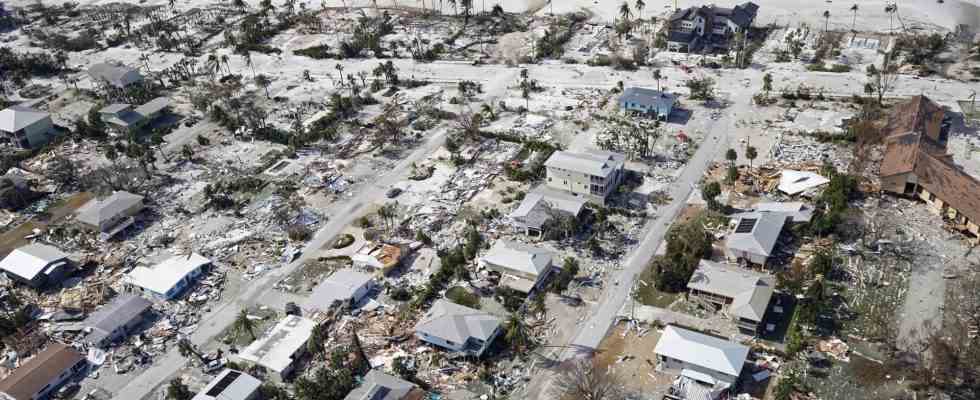As of: 03/20/2023 3:54 p.m
The Intergovernmental Panel on Climate Change has warned more clearly than ever before about climate change and called for drastic measures to reduce CO2 emissions. Because the 1.5 degree limit will be exceeded in the next decade.
Climate change is progressing faster and its consequences are more devastating than initially thought. This is the assessment made by the Intergovernmental Panel on Climate Change (IPCC) in its final report presented in Interlaken, Switzerland.
Almost all scenarios for mankind’s short-term greenhouse gas emissions predicted global warming of 1.5 degrees in the period 2030 to 2035, according to the so-called synthesis report. “The pace and scope of actions taken so far, as well as current plans, are insufficient to combat climate change,” the scientists said. However, the international community could achieve “a visible slowdown in global warming” through a “profound, rapid and sustained reduction in emissions”.
Drastic measures necessary
In order to limit the increase in temperature to 1.5 or a maximum of two degrees Celsius, greenhouse gas emissions would have to be drastically reduced in all sectors within this decade, otherwise the mark would be exceeded. The report goes on to say that the decisions made in this decade will have an impact on the next millennia.
However, even in the two most optimistic scenarios with a very significant reduction in emissions, the Intergovernmental Panel on Climate Change assumes that warming will temporarily exceed 1.5 degrees – and this for several decades. It’s clear why: “Public and private financial flows for fossil fuels are still larger than those for climate adaptation and climate protection,” the scientists write.
Even if this were only to be exceeded temporarily, this would have irreversible consequences, such as melting glaciers or rising sea levels. At the same time, the chairman of the council, Hoesung Lee, emphasized: “If we act now, we can still ensure a livable and sustainable future for all.”
65 percent less emissions by 2035
The warming is already around 1.1 degrees. According to the UN, the world is heading for a temperature rise of up to 2.6 degrees, even with the commitments made to date to save greenhouse gases.
In the Paris Climate Agreement in 2015, the international community agreed to limit global warming to 1.5 degrees Celsius compared to the pre-industrial age. However, emissions are currently increasing instead of decreasing – after a small decrease due to the corona pandemic, they are rising steeply again.
But global CO2 emissions would have to fall by 48 percent by 2030 compared to 2019 in order to limit global warming to 1.5 degrees. According to the Intergovernmental Panel on Climate Change, emissions would have to fall by 65 percent by 2035 compared to 2019.
“Threat to human well-being”
“Climate change is a threat to human well-being and the health of the planet,” the report said. Almost half of the world’s population, up to 3.6 billion people, live in regions that are likely to experience particularly severe consequences of climate change.
Impacts such as more frequent and severe heat waves, floods and droughts are already visible, such as the heat and floods in India and Pakistan in 2022 and the ongoing drought in sub-Saharan Africa. According to the World Health Organization (WHO), there could have been up to 43,000 additional deaths in Somalia due to the drought last year.
Baerbock: Sawing our branch
According to Foreign Minister Annalena Baerbock, the report “makes it clear with brutal clarity that we are sawing the branch on which we are sitting as a global community. 1.5 degrees is the planet’s pain threshold,” explained the Green politician. But the report also gives hope, the minister added: “It is still possible to keep 1.5 degrees within reach if we halve global emissions over the next seven years.”
Humanity has the necessary knowledge, the right technologies and also the financial resources, explained Baerbock. That is why she is working with the federal government for an ambitious global climate policy. “Because the decisions we make today will shape the world for millennia.”
Guterres: “Survival Guide to Humanity”
UN Secretary-General António Guterres also warned of the devastating consequences of climate change. “The climate time bomb is ticking. But today’s IPCC report is a guide to defusing the climate time bomb. It is a survival guide for humanity,” he said in a video link at the launch of the report.
He called for a quantum leap in climate protection measures such as the expansion of green energy. Climate efforts must be massively accelerated in every country and in every sector. The world needs climate action on all fronts.
UN body on global warming
The Intergovernmental Panel on Climate Change, based in Geneva, is the leading international body for scientific questions and answers about global warming. The new document is based on six reports that thousands of scientists have been working on for a good eight years.
It summarizes their findings and is intended to serve as a basis for political action. The document is considered an important diplomatic basis for upcoming climate negotiations. 195 countries belong to the Intergovernmental Panel on Climate Change.

